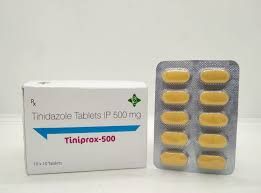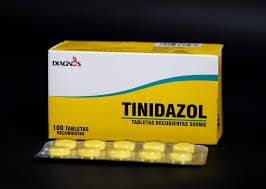Tinidazole is an antibiotic medication used primarily to treat various infections caused by protozoa and certain bacteria. It belongs to the class of drugs known as nitroimidazoles and is effective against a range of parasitic infections.
Key Features
- Active Ingredient: Each tablet contains 500mg of Tinidazole.
- Dosage Form: Available as oral tablets, commonly packaged in strips of 10 tablets.
Indications
Tinidazole is indicated for the treatment of:
- Giardiasis: An intestinal infection caused by the parasite Giardia lamblia.
- Amebiasis: An infection of the intestines caused by Entamoeba histolytica.
- Trichomoniasis: A sexually transmitted infection caused by the parasite Trichomonas vaginalis.
- Bacterial Vaginosis: A condition caused by an imbalance of normal bacterial flora in the vagina.
Mechanism of Action
Tinidazole works by disrupting the DNA synthesis of anaerobic bacteria and protozoa, leading to cell death. This action helps eliminate the infectious organisms causing the disease.
Dosage and Administration
- Recommended Dosage:
- For Giardiasis and Trichomoniasis: A single dose of 2 grams (2000 mg) taken orally.
- For Amebiasis: The recommended dosage is typically 2 grams once daily for 3 days.
- For Bacterial Vaginosis: A single dose of 2 grams or 1 gram daily for 5 days.
- Administration Tips: Tinidazole can be taken with or without food, but taking it with food may help reduce gastrointestinal side effects.
Side Effects
Common side effects may include:
- Nausea and vomiting
- Loss of appetite
- Diarrhea or constipation
- Stomach cramps or pain
- Metallic or bitter taste in the mouth
- Headache and dizziness
Serious side effects that require immediate medical attention include:
- Severe allergic reactions (e.g., rash, itching, swelling)
- Neurological symptoms (e.g., seizures, numbness, tingling)
- Signs of liver problems (e.g., jaundice)
Precautions
- Contraindications: Tinidazole should not be used in individuals with a known allergy to tinidazole or other nitroimidazoles. It is also contraindicated during the first trimester of pregnancy.
- Alcohol Interaction: Patients should avoid alcohol during treatment and for at least 72 hours after completing therapy due to the risk of a disulfiram-like reaction (flushing, nausea, vomiting).
- Drug Interactions: Caution is advised when used with anticoagulants, lithium, or phenytoin due to potential interactions.



